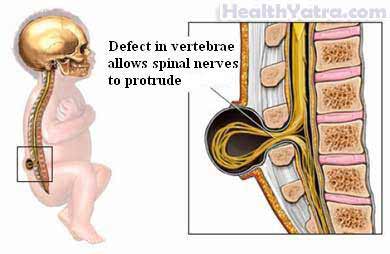Definition
Spina bifida is a type of birth defect. It is a problem with how the spine and spinal cord develops. Spina bifida can begin to develop in a fetus before the mother even knows she is pregnant. In some cases, structures that should be inside the spinal canal can slip out. The structures affected may include:
- Membranes that surround the spinal cord
- Nerve roots that connect nerves to the spinal cord
- Spinal cord
- Vertebra (back bones)—may be deformed

There are three kinds of spina bifida:
- Occulta—small defect in one or more backbones, least severe form, usually no complications
- Meningocele—membranes poke through an open part of the spine and can form a cysts
- Myelomeningocele—most severe form of spina bifida, membranes poke through and contain nerve roots or spinal cord and can lead to
- Paralysis and incontinence of bowel and bladder may occur—frequently not cured by surgery
- Hydrocephalus—a build up of fluids in the brain that increase pressure on the brain
Causes
The cause of spina bifida is not known. There is a strong genetic factor for some with spina bifida. This means there is a problem with the body’s blueprint.
Many studies have also shown a link between a low folate diet in the mother and birth defects. In particular, low folate diets are associated with an increased risk of spina bifida.
Risk Factors
Factors that increase the risk of spina bifida include:
- Low maternal blood level of folic acid at the time of conception
- Family history of spina bifida
- A mother who had a previous pregnancy with a neural tube defect
- Mother’s race: Hispanic or Caucasian of European origin
- Certain medications given during pregnancy
- Gender: Girls are more likely to have spina bifida.
Symptoms
Occulta may not have any symptoms. Some with this type may never know they have spina bifida. There may be a small tuft of hair or skin discoloration over the low back.
The immediate symptoms of meningocele and myelomeningocele include:
- Sac filled with fluid leading out from the baby’s spine
- Spinal cord and tissue may also protrude through the back
Infants and children with meningocele or myelomeningocele spina bifida may also experience long-term symptoms such as:
- Bowel and bladder problems
- Frequent urinary tract and other infections
- Learning disabilities
- Accumulation of fluid in the brain
- Scoliosis —abnormal curve to spine
- Inability to walk
- Muscle weakness and paralysis of the lower extremities
- Hip dislocation
- Foot and ankle deformities
- Many children with myelomeningocele are wheelchair bound
Diagnosis
Prenatal Testing
A blood test of the mother before birth can predict the risk of spina bifida. If the test predicts a high risk of neural tube defects, two more tests may be done:
- Amniocentesis —a sample of the fluid surrounding the baby is taken to measure for factors indicating problems of the spine
- Ultrasound —a test that uses sound waves to look at the fetal spine
A diagnosis before birth can help you and your doctor make plans. Surgery may be needed soon after birth.
After Birth Testing
After birth, meningocele and myelomeningocele are usually apparent on physical exam. Many tests will be needed to find out which bones and nerves are involved. The kidneys may also be damaged. They will need to be watched closely.
Most children with occulta spina bifida will never be diagnosed. This condition rarely causes any symptoms. It also has few complications. It may be discovered during a routine medical exam. It may also be found following x-rays of the lower back.
Treatment
Occulta spina bifida requires no treatment.
Meningocele spina bifida is treated with surgery. It is done to remove the cyst. This form of spina bifida can be treated.
Treatment for myelomeningocele spina bifida is very complicated. It may include surgery to place nerves and spinal cord back in place, physical therapy for any physical problems, and supportive care for any other complications. Treatments for myelomeningocele may include:
Surgery
During surgery, the nerves, membrane, and spinal cord are put back into place. It will be done within 24-48 hours after birth. In some cases, the surgery may be done before birth.
Surgery is done as early as possible to prevent further nerve damage. It cannot reverse damage that has already occurred.
More serious forms of spina bifida may require more surgeries throughout childhood.
Physical Therapy
Therapists will teach parents how to exercise the infant’s legs and feet. Walkers, braces, and crutches will often be needed to let the baby move around.
Ongoing Treatment
Complications of spina bifida can be ongoing and extensive. It will be important for you to work with a team of doctors. They should be able to provide the best care and support for you and your child. It is important for you to get help for your child’s physical needs and emotional support for you and your family
Prevention
To help reduce the chance that your baby will be born with spina bifida:
- If you plan to have a baby, take a folic acid supplement with at least 400 micrograms every. The supplements must begin before the baby is conceived. They should also be continued throughout the pregnancy. A vitamin supplement containing folate may be the most reliable method of getting folate but you can get it from food as well. Foods with significant quantities of folate include:
- Leafy green vegetables
- Orange juice
- Beans
- White flour products and cereals fortified with folate
- Plan your pregnancy. Talk to your doctor if you have any of the risk factors listed above. Ask your doctor if any medicines that you take increase the risk of having a baby with spina bifida.
